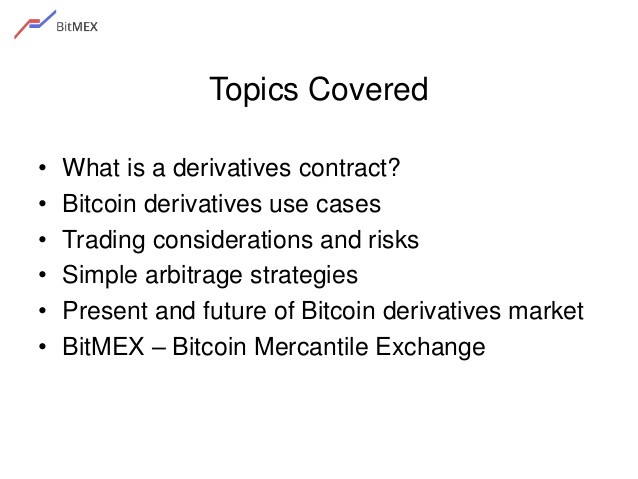Derivatives Futures and Protecting Against Bitcoin s Risks
Post on: 12 Июль, 2015 No Comment

Many companies and individuals are banking on bitcoin’s long-term prospects, hoping that the currency’s value will continue to rise.
According to a recent CoinDesk poll, 56% of bitcoiners think that the price of one BTC will reach $10,000 in 2014.
But wait — hasn’t it been made crystal clear that bitcoin is volatile. Isn’t it true that exchanges have vastly differing prices. How can investors avoid the hazardous and risky attributes of bitcoin?
Ways to protect value for those holding bitcoin (without exchanging it for fiat) must emerge. Hedging, a common financial procedure used in traditional markets, is one such method that can help individuals and companies maintain value if bitcoin’s price drops.
Hedging is used to counter against fluctuations, something that bitcoin investors are acutely aware of.
Bitcoin derivatives
Derivatives are instruments that allow investors to trade in something indirectly. As the name implies, they are “derived” units of value.
As such, derivatives are predicated on the idea that you can manipulate your position towards a security (eg a stock, a bond – or a bitcoin).
Singapore-based BTC.sx is currently the most popular platform for doing this. In November, BTC.sx reported over 2,000 registered users. A recent press release announced that the company had since brokered over $35m in transactions .
The company’s interface is simplistic, offering users only two buttons: ‘long’ for when investors think bitcoin will go up, ‘short’ for when the value will go down. But the UI probably belies the type of person that will really use BTC.sx.
“Those who use our platform are pretty sophisticated investors,” said George Samman, the chief operating officer of BTC.sx.
“We are a 24/7 operation where you can hedge at spot at all times as this volatile markets price constantly changes.”
Investors should be sophisticated: BTC.sx allows its customers to trade on margin.
This means users can place leveraged bets on the platform: “Customers on BTC.sx are able to go long or short on bitcoin with our platform. We offer 10x margin on their bitcoin,” said Samman.
It’s proving to be popular, and Samman says that the company really saw a huge spike in interest in the latter part of 2013. “We really started to see more interest in BTC.sx around October, when the price went from $200 to $1,200,” he said.
The company is now raising money to expand its operations.
Futures
Futures can be used as a long-term bet that something will rise or fall. This is slightly different to what BTC.sx is doing. At first, being locked into something long-term, like a contract, might not make immediate sense.
Unless you’ve invested a ton of money in something bitcoin-related, that is. Mining would be a good example of this.
The Russia-based exchange ICBIT , a site that’s been in operation for over two years. sells millions of futures contacts a month. Futures on ICBIT for March alone total over 2.4m in contracts. ICBIT makes money in this just like an exchange; they reap fees from every transaction.
One futures contract on ICBIT is worth $10. In order to cover $100,000 worth of bitcoin, for example, an investor would have to buy contracts worth $1,000 on ICBIT’s exchange.
The company told CoinDesk that some traders hedge bitcoin values up to $1m and that vast majority of their business comes from US customers.
If you are a big-time bitcoin miner, it makes sense to hedge the risk that lies ahead. Things like rising electricity costs, hardware obsolescence and dropping BTC valuations could be problematic for miners.
Although they are also known as being speculative bets, farmers are often commonly associated with futures. Farming can be risky – just look at the drought conditions in California. This is similar to what bitcoin miners are doing – hedging against the unknown.
The fact that ICBIT’s biggest attraction has been bitcoin, while other cryptocurrecies like litecoin do not have a big market, suggests that mining could be one of the biggest targets for these types of contracts.

Alternatives
New ways of reducing risk are coming. PawnCoin is a company that will give individual investors the ability to unlock a portion of bitcoin holdings. That company has said it will take on the risks of volatility while providing its customers with fiat liquidity.
New York-based bitcoin trading platform Coinsetter has been raising money to offer financial instruments in the future.
When asked about risk management products, Jaron Lukasiewicz, CEO of Coinsetter, said:
“Our legal team has spent considerable time formulating our regulatory strategy around offering futures and options to US institutions. We have a market making partnership lined up, and I believe we will be able to release a platform for it this year.”
Another alternative which may have less risk involved than futures or derivatives is insurance.
The Federal Deposit Insurance Corporation (FDIC) was originally formed in the United States to ensure that bank deposits were safe in the event of financial turmoil; other countries have a form of this as well to protect from cataclysmic events. A recent American Banker article discusses this idea for bitcoin.
And companies like Elliptic are doing this in an unregulated way right now, using insurer Lloyd’s of London to protect its deep cold storage wallets. But unlike hedging against volatility risk, Elliptic’s solution only protects investors in the event that a wallet is stolen.
Conclusion
Predicting the movement of bitcoin can seem like a completely implausible undertaking. But with derivatives and futures contracts, there is opportunity for sophisticated investors to profit, or at least cover their risks.
This is something that institutional investors and proprietary traders already use in financial markets to reduce the chance of loss. Insurance could also come into play at some point as bitcoin becomes a more popular financial asset.
Barry Silbert of SecondMarket and the Bitcoin Investment Trust has said that Wall Street is planning to invest in bitcoin during 2014. Some of these methods will certainly play a part in the ways that a growing collective of cryptocurrency investors will try to mitigate their risks.
When Wall Street comes knocking, bitcoin will need these types of products in order to properly apply institutional risk management techniques.
Analysis image via Shutterstock














